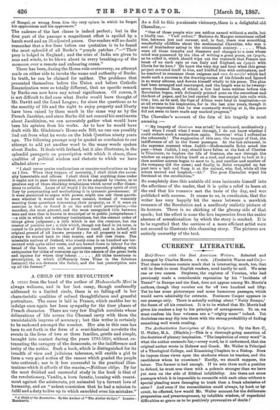A CHILD OF THE REVOLUTION.* - A STORY from the hand
of the author of Mademoiselle Mori is always welcome, and in her last essay, though confessedly addressed to a limited circle, there is no falling-off in her characteristic qualities of refined thoughtfulness and graceful portraiture. The scene is laid in France, which enables her to indulge once again her keen sympathy for the finer phases of French character. There are very few English novelists whose delineations of life across the Channel carry with them the unmistakable impress of accuracy ; but this writer is certainly to be reckoned amongst the number. Her aim in this case has been to set forth in the form of a semi-historical novelette the events in the lives of two or three families, gentle and simple, brought into contact during the years 1793-1810, without ex- tenuating the savagery of the democrats, or the indifference and levity of the nobles. Such a book, which is distinguished for its breadth of view and judicious tolerance, will enable a girl to form a very good notion of the causes which goaded the people into outbreak ; nor is it less successful in the practical illus- trations which it affords of the maxim,—Naleese oblige. By far the most finished and successful study in the book is that of the revolutionary, Vendee, a born fanatic, burning with resent. ment against the aristocrats, yet animated by a fervent love of humanity, and an " ardent conviction that he had a mission to fulfil and a duty to live up to which ennobled even his mistakes."
• A Chad of the Revolution. By the Author of The Atelier du Lye.. London: Itatokarda
As a foil to this passionate visionary, there is a delightful.old. Chevalier,—
" One of those people who are seldom named without a smile het a kindly one. Vieil enfant !' Madame de Maupas sometimes called him, between jest and earnest, and, in fact, there was something wonderfully childlike about the sentimental Chevalier, who was a sort of troubadour astray in the nineteenth century What were all these tumults and disasters and changes to a man whose mind was possessed by the idea of writing a great poem, an epopde, as he called it, which should wipe oat the reproach that France can boast of no sash epic as can Italy and England, an dpopee with Clovis for its hero ? He knew the very day and hour when this great project revealed itself to him, and kindled him with enthusiasm, and he resolved to renounce thole enigmas and vera de societe which had made such a success in the drawing-rooms of his friends and figured in so many albums, and devote himself wholly to his poem. The plan had been arranged and rearranged, and the length was to be twenty- seven, thousand lines, of which a few had been written before the- Revolution began, with delicately pointed pens on the smoothest and thickest of paper, and he had carried the manuscript into exile with. him; but, as he said, the fogs of Albion were fatal to inspiration—or at all events to his inspiration, for in the last nine years, though it was his impression that he was conetantly working at it, the poem did not seem to have made any marked progress."
The Chevalier's account of the fate of his tragedy is most amusing :—
" 'My tragedy of Gontran was acted,' he continued, meditatively ; ' and when I recall what I went through. I do not know whether I could endure such a martyrdom agein. Heavens ! what I suffered an the rehearsals ! The suggestion of this one, the temper of that, the. indifference of all to the finest passages. At the last rehearsal, in the supreme moment when Judith—Mademoiselle Belot acted the part—when Judith, I say, should have fallen at the feet of Charles Is T6meraire, to implore the life of Gontran, she saw throagh the window an angora licking itself on a roof, and stopped to look at it ; then another actress began to mew to it, and another and another of the company did the same; and finally, la Belot crumpled up her• part into a halt and Rang it at the animal, who tied, while all the actors mewed and laughed,—Ah!' The poor Chevalier wiped his forehead at the recollection."
So completely does this amiable old man insinuate himself into the affections of the reader, that it is quite a relief to learn at the end that his romance met the taste of the day, and was published with success. It seems to us, in conclusion, that the writer has very happily hit the mean between- a mawkish romance of the Revelation and a needlessly realistic picture of its horrors. There is no shirking of the gloomy side of that epoch; bat the effect is none the less impressive from the entire absence of sensationalism by which the story is marked. It is to be regretted that the services of a more efficient artist were not secured to illustrate this charming story. The pictures are entirely unworthy of the text.














































 Previous page
Previous page